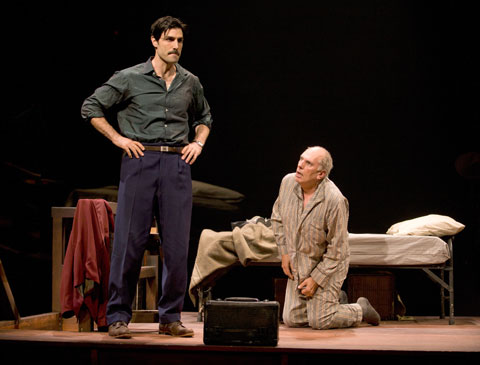
DOCUMENTARY Evan M. Wiener’s play about the capture of Adolf Eichmann (Michael Cristofer) settles for historic recitation rather than human drama. |
In a way, Adolf Eichmann had an even greater hold on the collective unconscious of those born after the war than the other Adolf. Hitler, in all those newsreels, was such an obvious lunatic, such a readymade symbol of evil, that you could only shake your head and wonder.
But Eichmann was a different kettle of Nazi. Whether or not you buy into Hannah Arendt's banality-of-evil theory, in the photos after his capture in 1960 and the footage of him in the bulletproof witness box during his trial a year later, he seemed the bureaucratic everyman — quiet, awkward, and professing to be a good soldier just following orders rather than an architect of murder.
All of which would make him a natural for a 21st century play. How do we turn a blind eye to how we're feeding into an immoral situation? (Hi there, Joe Paterno.) What would we do if we were in a German's shoes, whether Jewish or Gentile, during the war? Do beauty (Wagner) and beastliness emerge from the same wellspring?
Given such potential, it's disappointing, to say the least, that Captors, in its world premiere at the Huntington Theatre Company (through December 11 at the BU Theatre), settles for historic recitation instead of human drama. Comparing plays to Lifetime TV-movies has become a tried and true means of dismissing them, but playwright Evan M. Wiener doesn't seem to dig much deeper than a History Channel documentary.
Which isn't to say that Captors is dull or poorly produced. How the Israelis captured him in Argentina and got him out of the country is interesting enough, as were the interrogators' problems in getting him to admit the slightest moral responsibility for what he did. Peter Malkin, who was responsible for disguising Eichmann to elude the Argentineans and is the co-author of the memoir on which the play is based, finally got Eichmann to recount how he was high enough in the Nazi pecking order to get the best red wine. It's as close as the play comes to an Arthur Miller moment.
Wiener doesn't give the actors much to work with. The three Israeli captors are at each other's throats over the mission and how to get out of the country, but that's hardly the stuff of great drama. Louis Cancelmi as Malkin is the only one who rises above self-righteousness, as he engages Michael Cristofer's Eichmann in discussions about family, morality, and following orders. Although even here Wiener goes for easy point-making. After talking about how Jewish children called out to their parents as they boarded trains, Eichmann notes how his son liked trains too. And when Malkin tries to win Eichmann's favor, you wouldn't think Colonel Klink would fall for Malkin's tactics.
These scenes should be bristling with ideas and emotions, but Wiener is as flummoxed by Eichmann's moral stance as were the captors. Cristofer himself is an odd choice for the role. Stocky and with a broad face, he looks nothing like Eichmann (for most of the play, he doesn't even wear the signature black-rimmed eyeglasses). He seems more like someone sent over from Nazi central casting than the bookkeeper-like Eichmann. What ultimately made Eichmann stand apart was how little he looked and acted the part. Actors don't have to be mimics, but a leaner and hungrier look would help here.
Wiener and director Peter DuBois try to downplay the histrionics, but they don't replace it with much of anything that's intellectually or emotionally engaging. Captors is ultimately a prisoner of its own lack of theatrical ambition.